译林牛津版高中英语模块四Unit2 Sporting events直接引语和间接引语课件 (共59张PPT)
文档属性
| 名称 | 译林牛津版高中英语模块四Unit2 Sporting events直接引语和间接引语课件 (共59张PPT) | 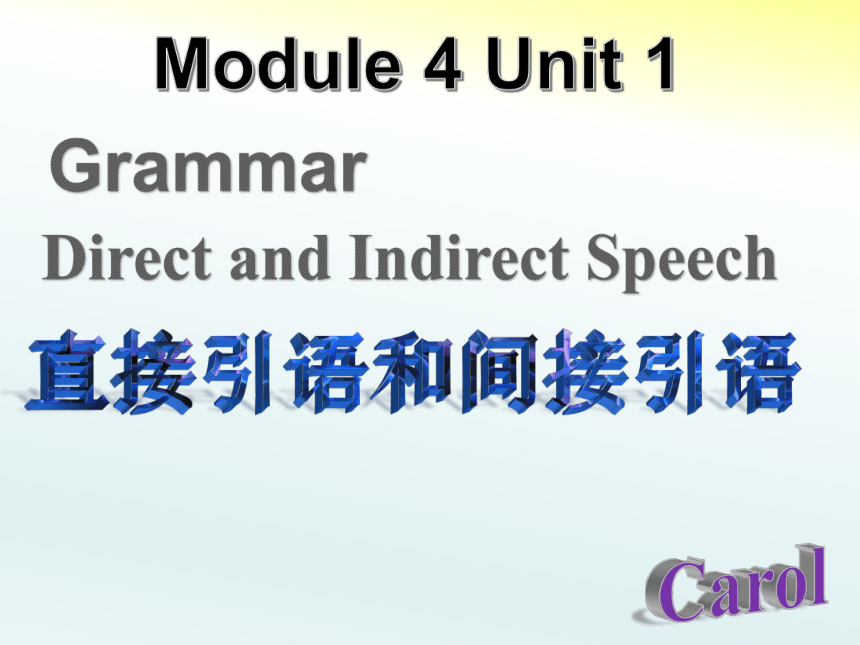 | |
| 格式 | zip | ||
| 文件大小 | 483.4KB | ||
| 资源类型 | 教案 | ||
| 版本资源 | 牛津译林版 | ||
| 科目 | 英语 | ||
| 更新时间 | 2019-05-30 20:24:53 | ||
图片预览

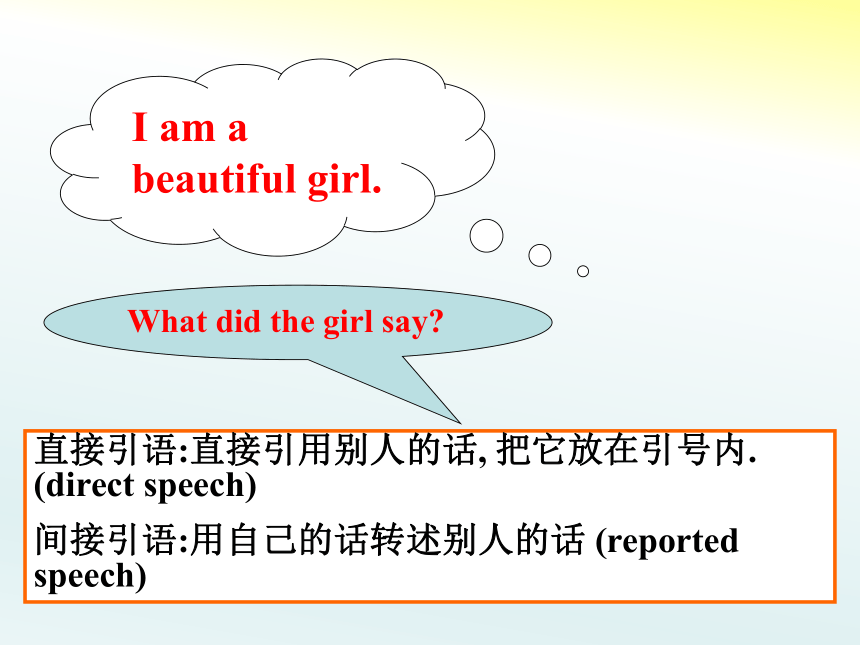
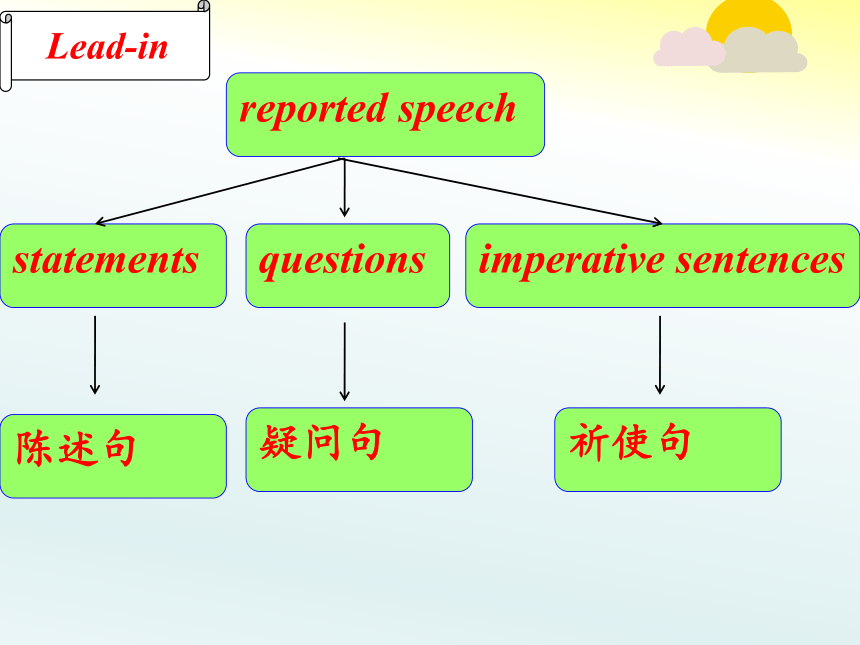
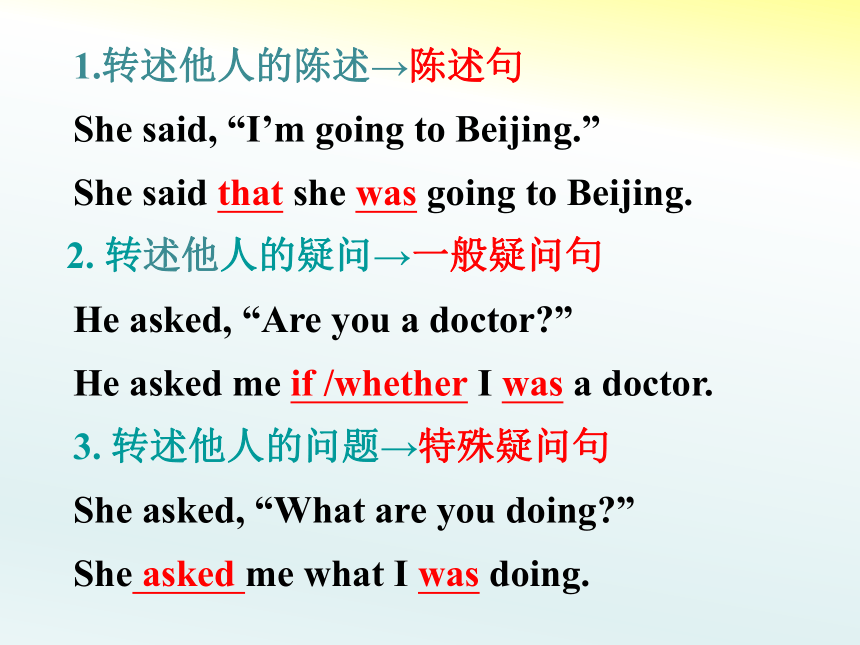
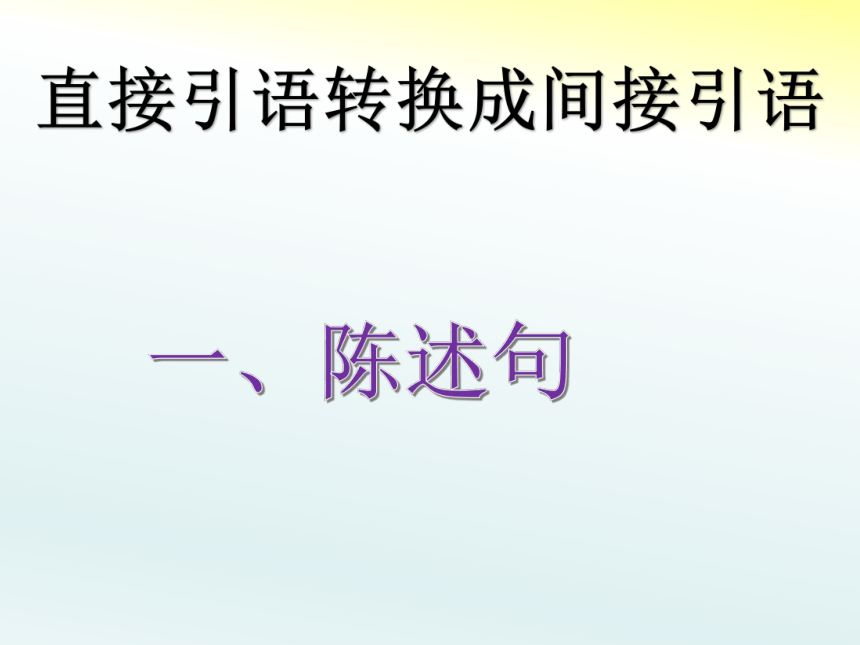
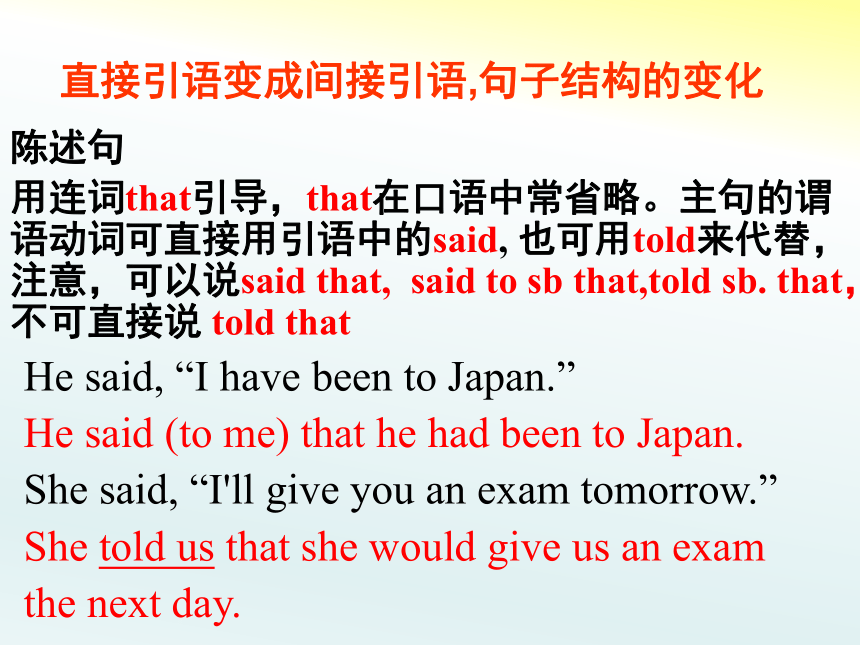

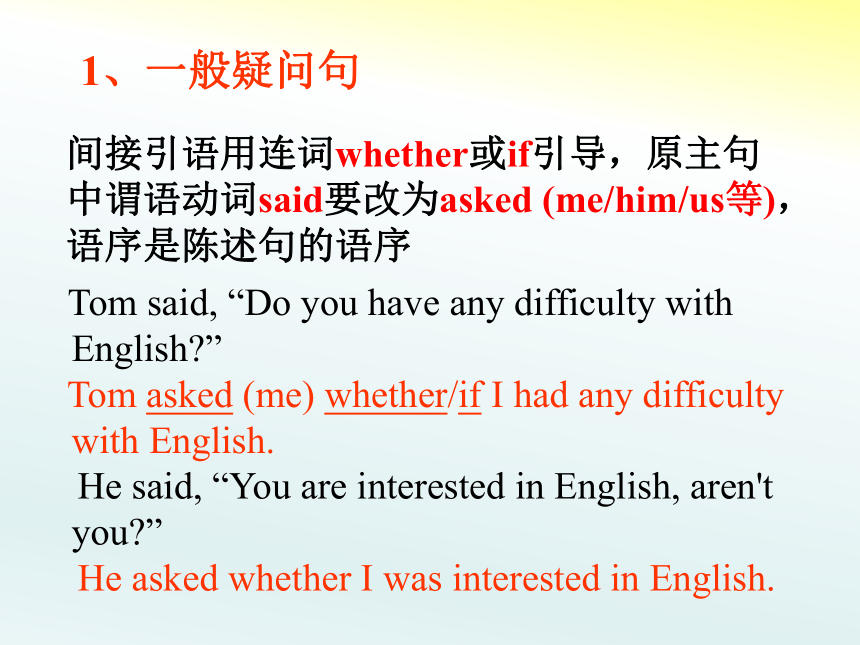
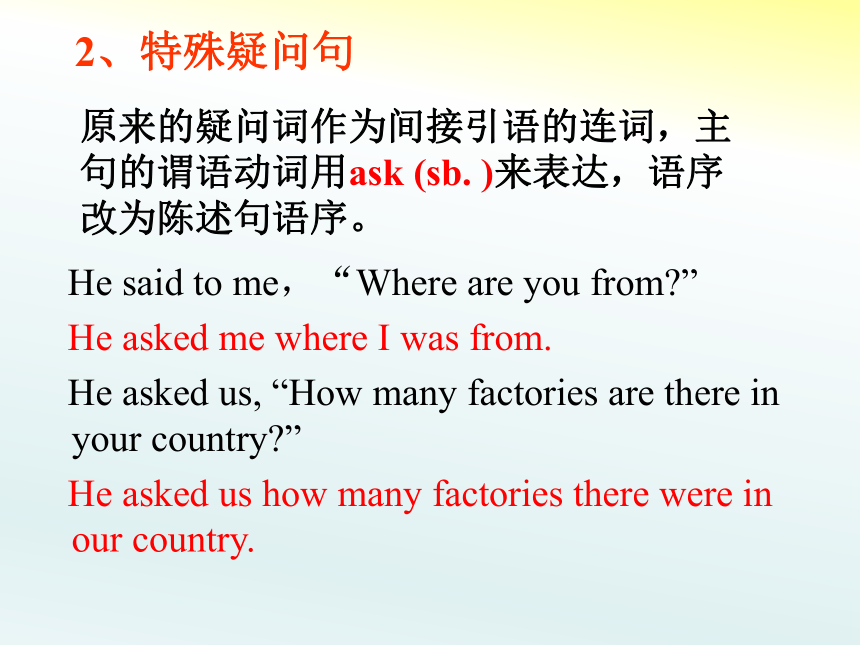
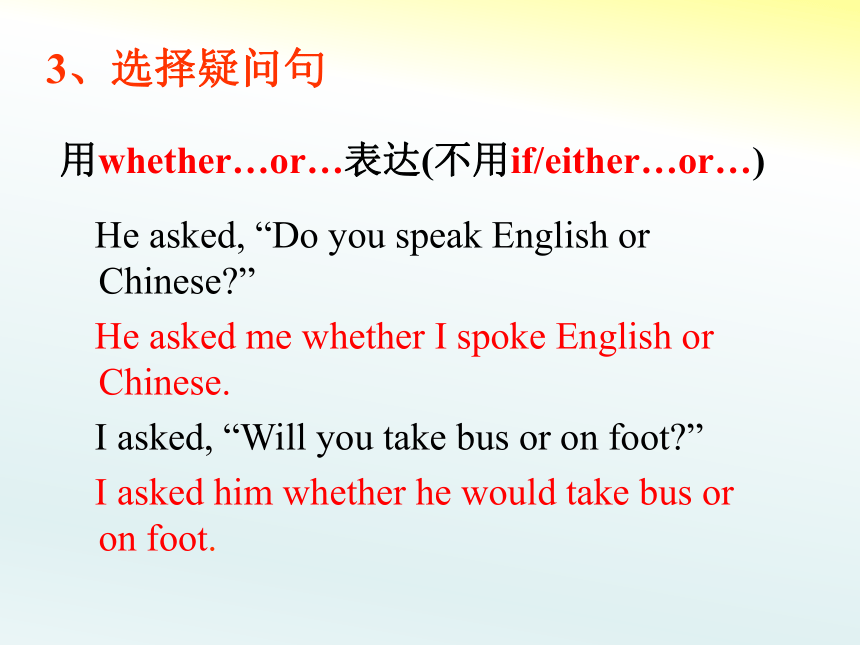

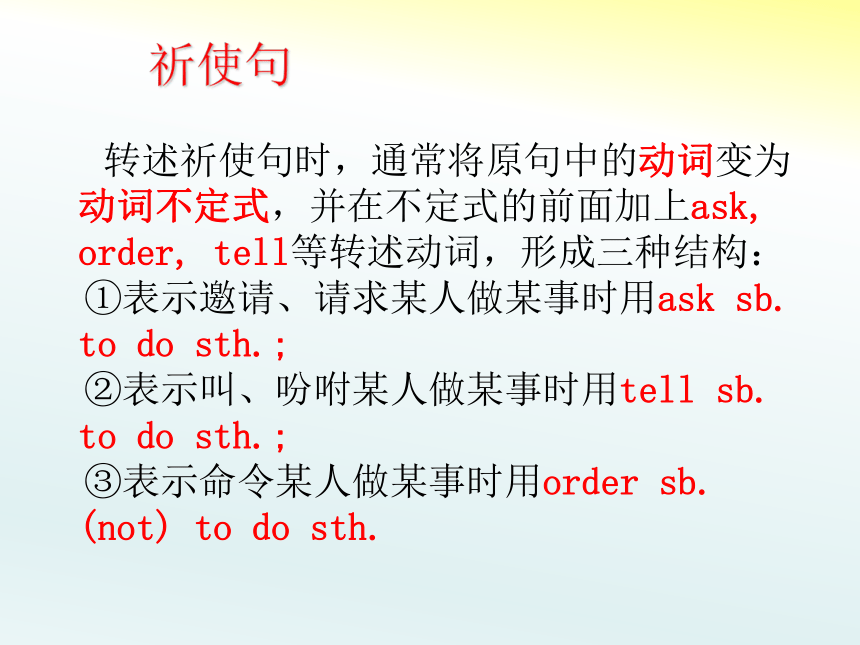
文档简介
课件59张PPT。zxxkModule 4 Unit 1直接引语和间接引语CarolDirect and Indirect SpeechGrammarI am a beautiful girl.She said that she was a beautiful girl.直接引语:直接引用别人的话, 把它放在引号内. (direct speech)
间接引语:用自己的话转述别人的话 (reported speech)What did the girl say?Lead-inreported speechstatementsquestionsimperative sentences陈述句疑问句祈使句1.转述他人的陈述→陈述句She asked me what I was doing.She said, “I’m going to Beijing.”She said that she was going to Beijing.He asked, “Are you a doctor?”He asked me if /whether I was a doctor.She asked, “What are you doing?”2. 转述他人的疑问→一般疑问句3. 转述他人的问题→特殊疑问句 一、陈述句直接引语转换成间接引语He said, “I have been to Japan.”
He said (to me) that he had been to Japan.
She said, “I'll give you an exam tomorrow.”
She told us that she would give us an exam
the next day. 陈述句
用连词that引导,that在口语中常省略。主句的谓语动词可直接用引语中的said, 也可用told来代替,注意,可以说said that, said to sb that,told sb. that,不可直接说 told that直接引语变成间接引语,句子结构的变化二、疑问句1、一般疑问句 Tom said, “Do you have any difficulty with English?”
Tom asked (me) whether/if I had any difficulty with English.
He said, “You are interested in English, aren't you?”
He asked whether I was interested in English. 间接引语用连词whether或if引导,原主句中谓语动词said要改为asked (me/him/us等),语序是陈述句的语序2、特殊疑问句 He said to me,“Where are you from?”
He asked me where I was from.
He asked us, “How many factories are there in your country?”
He asked us how many factories there were in our country. 原来的疑问词作为间接引语的连词,主句的谓语动词用ask (sb. )来表达,语序改为陈述句语序。3、选择疑问句 He asked, “Do you speak English or Chinese?”
He asked me whether I spoke English or Chinese.
I asked, “Will you take bus or on foot?”
I asked him whether he would take bus or on foot. 用whether…or…表达(不用if/either…or…)三、祈使句祈使句 转述祈使句时,通常将原句中的动词变为动词不定式,并在不定式的前面加上ask, order, tell等转述动词,形成三种结构:
①表示邀请、请求某人做某事时用ask sb. to do sth.;
②表示叫、吩咐某人做某事时用tell sb. to do sth.;
③表示命令某人做某事时用order sb. (not) to do sth.例如:
①She said to us, “Please have a rest.”
→She asked us to have a rest.
②The old man said, “Don't smoke in the hall.”
→The old man told me not to smoke in the hall.
③The officer said, “Go away.”
→The officer ordered us to go away. 注意:当祈使句的直接引语变为间接引语时,因为祈使句表示“请求”、“命令”等口气,所以祈使句直接引语变为间接引语时不存在时态的变化。但是人称、指示代词、时间、地点状语等的变化还应根据陈述句直接引语变间接引语的方法进行相应的改变。例如:
One of the doctors said, “Let me go on with the operation, Dr. Bethune.”
→ One of the doctors asked Dr. Bethune to let him go on with the operation. 基本概念直接引述别人的原话。通常都用引号“”括起来。用自己的话把别人的话转述出来。间接引语在多数情况下都构成一个宾语从句。
直接引语间接引语Conclusion要点突破要点一:连词变化1) He said , “I’m going to Beijing.”
2) He asked, “Are you a teacher?”
3) She said , “What are you doing?”
4)He asked, “Is this room yours or his?”
→ He said _______ he was going to Beijing.→ He asked me ___________ I was a doctor.→ She asked me _______ I was doing.→ He asked me ______ this room was mine __ his.thatwhether/ ifwhatwhetheror( )归纳:直接引语引号里的内容是:
1、陈述句,那么改为间接引语时,要用连接词
______,可以_______.that省略2、一般疑问句,要用连接词_________,不可以
_________.whether/if省略3、特殊疑问句,要用_____________,不可以
_________.特殊疑问词本身省略4、选择疑问句,要用_______________表达,
不可以________.whether…or…省略注意:引语中的疑问语序要变为__________语序。陈述要点二:主句动词的变化1. He said, “I have been to the Great Wall. ”
2. He said, “I'll give you an examination next Monday. ”
3. He said, “Do you have any difficulty with pronunciation?”
4. He said to me,“What's your name?” He ___________ that he had been to the Great Wall.said to me He ___________ that he would give us an examination
the next Monday.told usHe ________ (me) whether/if I had any difficulty with
my pronunciation.askedHe _______ me what my name was.asked一般情况下,主句谓语动词常为said或said to,变为间接
引语时:1)当直接引语是陈述句时,said一般不变,也可改为
_________;2)当直接引语是一般疑问句和特殊疑
问句时,则要把said 或said to变为_______ 或_________.toldaskedasked sb5. The?teacher?said?to?the?students,?“Don’t?waste?
your?time.”?
???
6. The?mother?said,?“Tom,?get?up?early,?please.”
→ The?teacher?_______?the?students?not?to?waste?
their?time.told→ The?mother?________?Tom?to?get?up?early. asked祈使句的直接引语变间接引语,要采用“____+_____+______”结构。
? 即?____?/______/?______/ ______ +sb.?(not)?+to?do?sth.
注意:引语中的呼语可改成宾语,引语中的please?去掉,动词
改为?ask? 动词宾语不定式tellaskorderwarn要点三:从句人称的变化1.They said to me, “ We will go there by bus.”
2. She said to me, “ Are you interested in science?”
3. His mother said to me, “ He can’t go to school.”They said________ would go there by bus. theyShe asked me if ______ was interested in science.IHis mother told me that _______ couldn’t go to school.he从句主语人称要遵循__________________的原则。一主、二宾、三不变①直接引语里的第一人称,变为间接引语时要和主句的主语保持一致。②直接引语里的第二人称,变为间接引语时要和主句的宾语保持一致。③直接引语里的第三人称,变为间接引语时,人称不变。 注意人称和指示代词变化。人称的变化 一主二宾三不变 即当引语的人称为第一人称的时候,就把他变为主句主语的人称;当引语的人称为第二人称的时候,就把他变为主句宾语的人称; 当引语的人称为第三人称的时候不改变.He said , “ I like it very much.” →
He said he liked it very much.
He said to me, “I broke your CD player.” →
He told me he had broken my CD player.直接引语 间接引语一般现在时 一般过去时 现在进行时 过去进行时一般过去时 过去完成时现在完成时 过去完成时一般将来时 过去将来时要点四:时态变化时态的变化 : 当主句的谓语动词为过去时是才变,否则不变。 一般现在时→一般过去时(do/does→did;am/is/are→was/were)
He said , “ I ‘m afraid I can’t finish the work.” →He said that he was afraid he couldn’t finish the work.
现在进行时→过去进行时:
He said , “ I’m using the knife.” →
He said he was using the knife.由直接引语转变为间接引语,下列情况时态不变:
The teacher said to the students, “Water freezes when the temperature falls below 0℃.”
→ The teacher told the students that water ________ when the temperature _________ below 0℃.fallsfreezes1. 客观不变的真理
2. 历史上的事件或间接引语中有明确的过去时间状语,
仍可用一般过去时,不必改为过去完成时。 The teacher said, “World War Ⅱ ended in 1945.”
The girl said, “I was born in 1978.”→ The teacher said that World War Ⅱ _______
in 1945.ended→ The girl said that she ______________ in 1978.was born
She said to me: “You must hurry up.”
→ She said that I _______ hurry up.3. 部分情态动词,如must, ought to, used to,
had better等:mustShe says that she’ll never forget the days in the country.4.如果直接引语所表述的内容在目前和说话
时同样有效,变间接引语时,时态可不变。The children said, “We love this game.”They told us that they love that game.5. 主句谓语动词的时态是现在时态,在引述
时,时态不变。She says, “I’ll never forget the days in the country.”要点五、时间和地点变化 注意时间和地点的变化时间状语的变化now →then : He said , “it’s nine o’clock now.” → He said that it was nine o’clock then.
today →that day: He said , “ I haven’t seen her today.” → He said that he hadn’t seen her that day.
yesterday →the day before
She said, “I went there yesterday,” → She said that she had gone there the day before.
tomorrow →the next day:
She said, “I’ll go there tomorrow.” → She said that she would go there the next day.
要点六、谓语动词的变化其他的变化This → that: She said, “I’ll finish it this morning.” →She said that she would finish it that morning .
these →those: He said, “These books are mine.” →He said that those books were his.
ago →before : He said, “ She left 30 minutes ago.”
→He said that she had left 30 minutes before.
here → there : He said, “ My sister was here one week ago.” →He said that his sister had been there one week before.
Come →go: She said, “I’ll come here this evening.” →She said that she would go there that evening.Direct speech and reported speech1. She said , ‘ PSAs are meant to educate people .
2. She said that PSAs are meant to educate people.
3. One toothpaste ad said that Bright-Teeth fights bad breath!
4. One toothpaste ad said, ‘Bright-Teeth fights bad breath!’
5. Tom said, ‘I will go to Miami tomorrow.’
6. She told us something secret.
7. The students said, ‘our basketball team is the champion.’
8. The students said that their basketball team is the champion.direct speechreported speech课堂练习“Are you going to your home town this summer?” he said. He asked me if I was going to my home town that summer.2. “Why didn’t you call me an hour ago?” he said.He asked why I hadn’t called him an
hour before.3. Mother asked, “What has happened
to you, Xiao Li ?” Mother asked Xiao Li what had happened to him4. He often says “I shall tell you about them.” He often tells me that he will tell me about them.5. Mr. Black said, “I have walked a long way this week.”Mr. Black said that he had walked a long way that week.6. They said to us, “ Are you afraid to leave this house ?” They asked us if we were afraid to leave that house.Ex: Page 9Possible answers:
(1) was (2) would be (3) had read
(4)that (5)would (6) had bought
(7) that (8) would (9) those
(10)her 2019/7/29Ex. Page 11A:
2 asked how it could help him remember English words.
3 asked whether/if it taught listening and speaking.
4 asked what the designer would do if she was not satisfied with the software.
5 asked if it was easy to use.Ex. Page 11B:
2 encourages us to use interesting and attractive photos.
3 recommends that we (should)use eye-catching logos.
4 suggests that we (should)make the slogans short and rasy to remamber.
5 tells us to make good use of colours to attract people's attention.把下列句子改为间接引语“I don’t think I will be able to finish it in time,” Mike said.
“It’s the most interesting film I’ve ever seen,” he told his friend.Mike said that he didn’t think he would be able to finish it in time.He told his friend that it was the most interesting film he had ever seen.3. The doctor said, “The man has hurt his
leg rather badly.”
4. My mother said, “Have your rotten tooth
been pulled out?”
The doctor said that the man had hurt his leg rather badly.My mother asked if my rotten tooth had been pulled out.5. “How will you go to the park?” Brown said to his younger brother.Brown asked his younger brother how he would go to the park.把下列句子改为直接引语He asked why people went to hamburger restaurants.
The student told his head teacher that he would go to the Great Wall the next day.He asked, “Why do people go to hamburger restaurants?”The student said to his head teacher, “I’ll go to the Great Wall tomorrow.”3. I asked her if she enjoyed the movie she had seen.
4. Mr. Wang asked how he could improve his spoken English.
5. She asked me what I had eaten the day before.I said to her, “Do you enjoy the movie you saw?”Mr. Wang said, “How can I improve my spoken English?”She said to me, “What did you eat yesterday?”A)变下列直接引语为间接引语。
1.“Stop talking!” the monitor said to the class.
2. “Repeat it three times,” the teacher said to her.
???
3. “Will you buy some bread for me?” he said to her.
4.“Don't take off your coat,” she said to her sister.
???
关于祈使句的练习The monitor told the class to stop talking. The teacher asked her to repeat it three times. He asked her to buy some bread for him. She asked her sister not to take off her coat. B) 填空完成间接引语,每空一词。
6. “Don't forget to give the message to my wife,” he said to Li Ping.
??? He _______?Li Ping _______? _______? forget to give the message to _______?wife.
7. “Mum, please help me find my shirt,” he said.
??? He _______? his mother _______? help?_______?find _______? shirt. toldnot tohisaskedtohimhis8. “Use your knife to cut the boots open,” the officer said to the guard.
??? The officer _______? the guard? _______? _______? _______?knife to cut the boots open.
9. “Don't spend too much time on football!” Mother said to me.
??? Mother _______? me? _______? _______? ______?too much time on football.
10. “Will you sleep and get up early, children?” Father said.
??? Father _______? the children _______? _______? and _______? up early.
orderedtoldaskedto gettousehisnottospendsleepC)单项选择。
11. “Don't worry about me,” she _______? her sister.
??? A. said to B. referred to C. thanked to D. spoke
12. “ _______? help me with my English?” she said.
??A. Shall we B.Do you C. Could you D. Might you
13. She told me _______? a noise in the hall.
??? A. don't make B. not to make
C. make not to D. to make not ACB14. Martin _______? his dog to lie down under the big tree.
??? A. made B. had
C. promised D. ordered
15. His father asked the boy, “ _______? are doing this for?”
??? A. What; you B. Which; you?
C. Where; we D. Why; we DA He asked ________ for the computer.
A. did I pay how much
B. I paid how much
C. how much did I pay
D. how much I paid
宾语从句要用陈述句语序。 D Practice “Have you seen the film?” he asked me. →He asked me _______.
A. had I seen the film
B. have I seen the film
C. if I have seen the film
D. whether I had seen the film
一般疑问句要变成whether或if引导的宾语从句. D “Please close the window,” he said to me.
→He ______ me _____ the window.
A. said to; to close
B. told to; closing
C. asked ; to close
D. said to; please close
直接引语为祈使句, 变间接引语时, 主句中的谓语动词往往根据直接引语的口气换用ask (请求), tell (告诉), order (命令), invite (邀请), warn (警告), advise (建议)等, 而直接引语中的谓语动词要变成动词不等式。即ask / tell / order / invite / warn / advise sb. (not) to do sth. C“I am a teacher,” Jack said.
→He said _________.
A. that I am a teacher
B. I was a teacher
C. that he is a teacher
D. he was a teacher
直接引语为陈述句, 变间接引语时用that引导(口语中常省略)。 D He said, “Mother, the boy is very naughty.”
→He _____- very naughty.
A. said his mother that the boy was
B. said to his mother that the boy is
C. told his mother that the boy was
D. spoke to his mother that the boy was
C“You’ve already got well, haven’t you?” she asked.
→She asked ________.
A. if I have already got well, hadn’t you
B. whether I had already got well
C. have I already got well
D. had I already got well.
反意疑问句要变成whether或if引导的宾语从句。 B
HomeworkPage92 C1& C2.
间接引语:用自己的话转述别人的话 (reported speech)What did the girl say?Lead-inreported speechstatementsquestionsimperative sentences陈述句疑问句祈使句1.转述他人的陈述→陈述句She asked me what I was doing.She said, “I’m going to Beijing.”She said that she was going to Beijing.He asked, “Are you a doctor?”He asked me if /whether I was a doctor.She asked, “What are you doing?”2. 转述他人的疑问→一般疑问句3. 转述他人的问题→特殊疑问句 一、陈述句直接引语转换成间接引语He said, “I have been to Japan.”
He said (to me) that he had been to Japan.
She said, “I'll give you an exam tomorrow.”
She told us that she would give us an exam
the next day. 陈述句
用连词that引导,that在口语中常省略。主句的谓语动词可直接用引语中的said, 也可用told来代替,注意,可以说said that, said to sb that,told sb. that,不可直接说 told that直接引语变成间接引语,句子结构的变化二、疑问句1、一般疑问句 Tom said, “Do you have any difficulty with English?”
Tom asked (me) whether/if I had any difficulty with English.
He said, “You are interested in English, aren't you?”
He asked whether I was interested in English. 间接引语用连词whether或if引导,原主句中谓语动词said要改为asked (me/him/us等),语序是陈述句的语序2、特殊疑问句 He said to me,“Where are you from?”
He asked me where I was from.
He asked us, “How many factories are there in your country?”
He asked us how many factories there were in our country. 原来的疑问词作为间接引语的连词,主句的谓语动词用ask (sb. )来表达,语序改为陈述句语序。3、选择疑问句 He asked, “Do you speak English or Chinese?”
He asked me whether I spoke English or Chinese.
I asked, “Will you take bus or on foot?”
I asked him whether he would take bus or on foot. 用whether…or…表达(不用if/either…or…)三、祈使句祈使句 转述祈使句时,通常将原句中的动词变为动词不定式,并在不定式的前面加上ask, order, tell等转述动词,形成三种结构:
①表示邀请、请求某人做某事时用ask sb. to do sth.;
②表示叫、吩咐某人做某事时用tell sb. to do sth.;
③表示命令某人做某事时用order sb. (not) to do sth.例如:
①She said to us, “Please have a rest.”
→She asked us to have a rest.
②The old man said, “Don't smoke in the hall.”
→The old man told me not to smoke in the hall.
③The officer said, “Go away.”
→The officer ordered us to go away. 注意:当祈使句的直接引语变为间接引语时,因为祈使句表示“请求”、“命令”等口气,所以祈使句直接引语变为间接引语时不存在时态的变化。但是人称、指示代词、时间、地点状语等的变化还应根据陈述句直接引语变间接引语的方法进行相应的改变。例如:
One of the doctors said, “Let me go on with the operation, Dr. Bethune.”
→ One of the doctors asked Dr. Bethune to let him go on with the operation. 基本概念直接引述别人的原话。通常都用引号“”括起来。用自己的话把别人的话转述出来。间接引语在多数情况下都构成一个宾语从句。
直接引语间接引语Conclusion要点突破要点一:连词变化1) He said , “I’m going to Beijing.”
2) He asked, “Are you a teacher?”
3) She said , “What are you doing?”
4)He asked, “Is this room yours or his?”
→ He said _______ he was going to Beijing.→ He asked me ___________ I was a doctor.→ She asked me _______ I was doing.→ He asked me ______ this room was mine __ his.thatwhether/ ifwhatwhetheror( )归纳:直接引语引号里的内容是:
1、陈述句,那么改为间接引语时,要用连接词
______,可以_______.that省略2、一般疑问句,要用连接词_________,不可以
_________.whether/if省略3、特殊疑问句,要用_____________,不可以
_________.特殊疑问词本身省略4、选择疑问句,要用_______________表达,
不可以________.whether…or…省略注意:引语中的疑问语序要变为__________语序。陈述要点二:主句动词的变化1. He said, “I have been to the Great Wall. ”
2. He said, “I'll give you an examination next Monday. ”
3. He said, “Do you have any difficulty with pronunciation?”
4. He said to me,“What's your name?” He ___________ that he had been to the Great Wall.said to me He ___________ that he would give us an examination
the next Monday.told usHe ________ (me) whether/if I had any difficulty with
my pronunciation.askedHe _______ me what my name was.asked一般情况下,主句谓语动词常为said或said to,变为间接
引语时:1)当直接引语是陈述句时,said一般不变,也可改为
_________;2)当直接引语是一般疑问句和特殊疑
问句时,则要把said 或said to变为_______ 或_________.toldaskedasked sb5. The?teacher?said?to?the?students,?“Don’t?waste?
your?time.”?
???
6. The?mother?said,?“Tom,?get?up?early,?please.”
→ The?teacher?_______?the?students?not?to?waste?
their?time.told→ The?mother?________?Tom?to?get?up?early. asked祈使句的直接引语变间接引语,要采用“____+_____+______”结构。
? 即?____?/______/?______/ ______ +sb.?(not)?+to?do?sth.
注意:引语中的呼语可改成宾语,引语中的please?去掉,动词
改为?ask? 动词宾语不定式tellaskorderwarn要点三:从句人称的变化1.They said to me, “ We will go there by bus.”
2. She said to me, “ Are you interested in science?”
3. His mother said to me, “ He can’t go to school.”They said________ would go there by bus. theyShe asked me if ______ was interested in science.IHis mother told me that _______ couldn’t go to school.he从句主语人称要遵循__________________的原则。一主、二宾、三不变①直接引语里的第一人称,变为间接引语时要和主句的主语保持一致。②直接引语里的第二人称,变为间接引语时要和主句的宾语保持一致。③直接引语里的第三人称,变为间接引语时,人称不变。 注意人称和指示代词变化。人称的变化 一主二宾三不变 即当引语的人称为第一人称的时候,就把他变为主句主语的人称;当引语的人称为第二人称的时候,就把他变为主句宾语的人称; 当引语的人称为第三人称的时候不改变.He said , “ I like it very much.” →
He said he liked it very much.
He said to me, “I broke your CD player.” →
He told me he had broken my CD player.直接引语 间接引语一般现在时 一般过去时 现在进行时 过去进行时一般过去时 过去完成时现在完成时 过去完成时一般将来时 过去将来时要点四:时态变化时态的变化 : 当主句的谓语动词为过去时是才变,否则不变。 一般现在时→一般过去时(do/does→did;am/is/are→was/were)
He said , “ I ‘m afraid I can’t finish the work.” →He said that he was afraid he couldn’t finish the work.
现在进行时→过去进行时:
He said , “ I’m using the knife.” →
He said he was using the knife.由直接引语转变为间接引语,下列情况时态不变:
The teacher said to the students, “Water freezes when the temperature falls below 0℃.”
→ The teacher told the students that water ________ when the temperature _________ below 0℃.fallsfreezes1. 客观不变的真理
2. 历史上的事件或间接引语中有明确的过去时间状语,
仍可用一般过去时,不必改为过去完成时。 The teacher said, “World War Ⅱ ended in 1945.”
The girl said, “I was born in 1978.”→ The teacher said that World War Ⅱ _______
in 1945.ended→ The girl said that she ______________ in 1978.was born
She said to me: “You must hurry up.”
→ She said that I _______ hurry up.3. 部分情态动词,如must, ought to, used to,
had better等:mustShe says that she’ll never forget the days in the country.4.如果直接引语所表述的内容在目前和说话
时同样有效,变间接引语时,时态可不变。The children said, “We love this game.”They told us that they love that game.5. 主句谓语动词的时态是现在时态,在引述
时,时态不变。She says, “I’ll never forget the days in the country.”要点五、时间和地点变化 注意时间和地点的变化时间状语的变化now →then : He said , “it’s nine o’clock now.” → He said that it was nine o’clock then.
today →that day: He said , “ I haven’t seen her today.” → He said that he hadn’t seen her that day.
yesterday →the day before
She said, “I went there yesterday,” → She said that she had gone there the day before.
tomorrow →the next day:
She said, “I’ll go there tomorrow.” → She said that she would go there the next day.
要点六、谓语动词的变化其他的变化This → that: She said, “I’ll finish it this morning.” →She said that she would finish it that morning .
these →those: He said, “These books are mine.” →He said that those books were his.
ago →before : He said, “ She left 30 minutes ago.”
→He said that she had left 30 minutes before.
here → there : He said, “ My sister was here one week ago.” →He said that his sister had been there one week before.
Come →go: She said, “I’ll come here this evening.” →She said that she would go there that evening.Direct speech and reported speech1. She said , ‘ PSAs are meant to educate people .
2. She said that PSAs are meant to educate people.
3. One toothpaste ad said that Bright-Teeth fights bad breath!
4. One toothpaste ad said, ‘Bright-Teeth fights bad breath!’
5. Tom said, ‘I will go to Miami tomorrow.’
6. She told us something secret.
7. The students said, ‘our basketball team is the champion.’
8. The students said that their basketball team is the champion.direct speechreported speech课堂练习“Are you going to your home town this summer?” he said. He asked me if I was going to my home town that summer.2. “Why didn’t you call me an hour ago?” he said.He asked why I hadn’t called him an
hour before.3. Mother asked, “What has happened
to you, Xiao Li ?” Mother asked Xiao Li what had happened to him4. He often says “I shall tell you about them.” He often tells me that he will tell me about them.5. Mr. Black said, “I have walked a long way this week.”Mr. Black said that he had walked a long way that week.6. They said to us, “ Are you afraid to leave this house ?” They asked us if we were afraid to leave that house.Ex: Page 9Possible answers:
(1) was (2) would be (3) had read
(4)that (5)would (6) had bought
(7) that (8) would (9) those
(10)her 2019/7/29Ex. Page 11A:
2 asked how it could help him remember English words.
3 asked whether/if it taught listening and speaking.
4 asked what the designer would do if she was not satisfied with the software.
5 asked if it was easy to use.Ex. Page 11B:
2 encourages us to use interesting and attractive photos.
3 recommends that we (should)use eye-catching logos.
4 suggests that we (should)make the slogans short and rasy to remamber.
5 tells us to make good use of colours to attract people's attention.把下列句子改为间接引语“I don’t think I will be able to finish it in time,” Mike said.
“It’s the most interesting film I’ve ever seen,” he told his friend.Mike said that he didn’t think he would be able to finish it in time.He told his friend that it was the most interesting film he had ever seen.3. The doctor said, “The man has hurt his
leg rather badly.”
4. My mother said, “Have your rotten tooth
been pulled out?”
The doctor said that the man had hurt his leg rather badly.My mother asked if my rotten tooth had been pulled out.5. “How will you go to the park?” Brown said to his younger brother.Brown asked his younger brother how he would go to the park.把下列句子改为直接引语He asked why people went to hamburger restaurants.
The student told his head teacher that he would go to the Great Wall the next day.He asked, “Why do people go to hamburger restaurants?”The student said to his head teacher, “I’ll go to the Great Wall tomorrow.”3. I asked her if she enjoyed the movie she had seen.
4. Mr. Wang asked how he could improve his spoken English.
5. She asked me what I had eaten the day before.I said to her, “Do you enjoy the movie you saw?”Mr. Wang said, “How can I improve my spoken English?”She said to me, “What did you eat yesterday?”A)变下列直接引语为间接引语。
1.“Stop talking!” the monitor said to the class.
2. “Repeat it three times,” the teacher said to her.
???
3. “Will you buy some bread for me?” he said to her.
4.“Don't take off your coat,” she said to her sister.
???
关于祈使句的练习The monitor told the class to stop talking. The teacher asked her to repeat it three times. He asked her to buy some bread for him. She asked her sister not to take off her coat. B) 填空完成间接引语,每空一词。
6. “Don't forget to give the message to my wife,” he said to Li Ping.
??? He _______?Li Ping _______? _______? forget to give the message to _______?wife.
7. “Mum, please help me find my shirt,” he said.
??? He _______? his mother _______? help?_______?find _______? shirt. toldnot tohisaskedtohimhis8. “Use your knife to cut the boots open,” the officer said to the guard.
??? The officer _______? the guard? _______? _______? _______?knife to cut the boots open.
9. “Don't spend too much time on football!” Mother said to me.
??? Mother _______? me? _______? _______? ______?too much time on football.
10. “Will you sleep and get up early, children?” Father said.
??? Father _______? the children _______? _______? and _______? up early.
orderedtoldaskedto gettousehisnottospendsleepC)单项选择。
11. “Don't worry about me,” she _______? her sister.
??? A. said to B. referred to C. thanked to D. spoke
12. “ _______? help me with my English?” she said.
??A. Shall we B.Do you C. Could you D. Might you
13. She told me _______? a noise in the hall.
??? A. don't make B. not to make
C. make not to D. to make not ACB14. Martin _______? his dog to lie down under the big tree.
??? A. made B. had
C. promised D. ordered
15. His father asked the boy, “ _______? are doing this for?”
??? A. What; you B. Which; you?
C. Where; we D. Why; we DA He asked ________ for the computer.
A. did I pay how much
B. I paid how much
C. how much did I pay
D. how much I paid
宾语从句要用陈述句语序。 D Practice “Have you seen the film?” he asked me. →He asked me _______.
A. had I seen the film
B. have I seen the film
C. if I have seen the film
D. whether I had seen the film
一般疑问句要变成whether或if引导的宾语从句. D “Please close the window,” he said to me.
→He ______ me _____ the window.
A. said to; to close
B. told to; closing
C. asked ; to close
D. said to; please close
直接引语为祈使句, 变间接引语时, 主句中的谓语动词往往根据直接引语的口气换用ask (请求), tell (告诉), order (命令), invite (邀请), warn (警告), advise (建议)等, 而直接引语中的谓语动词要变成动词不等式。即ask / tell / order / invite / warn / advise sb. (not) to do sth. C“I am a teacher,” Jack said.
→He said _________.
A. that I am a teacher
B. I was a teacher
C. that he is a teacher
D. he was a teacher
直接引语为陈述句, 变间接引语时用that引导(口语中常省略)。 D He said, “Mother, the boy is very naughty.”
→He _____- very naughty.
A. said his mother that the boy was
B. said to his mother that the boy is
C. told his mother that the boy was
D. spoke to his mother that the boy was
C“You’ve already got well, haven’t you?” she asked.
→She asked ________.
A. if I have already got well, hadn’t you
B. whether I had already got well
C. have I already got well
D. had I already got well.
反意疑问句要变成whether或if引导的宾语从句。 B
HomeworkPage92 C1& C2.
